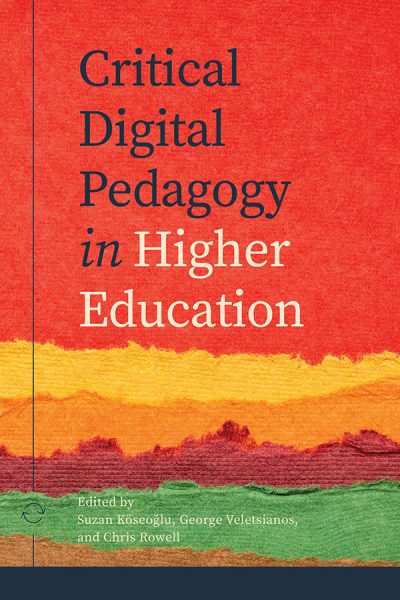Recent efforts to solve the problems of education—created by neoliberalism in and out of higher education—have centred on the use of technology that promises efficiency, progress tracking, and automation. The editors of this volume argue that using technology in this way reduces learning to a transaction. They ask administrators, instructors, and learning designers to reflect on our relationship with these tools and explore how to cultivate a pedagogy of care in an online environment. With an eye towards identifying different and better possibilities, this collection investigates previously under-examined concepts in the field of digital pedagogy such as shared learning and trust, critical consciousness, change, and hope.
About the Editors
Suzan Köseoğlu is a lecturer in Higher Education Teaching and Learning at the University of Greenwich (UK). George Veletsianos is a professor at Royal Roads University and holds a Canada Research Chair in Innovative Learning and Technology. Chris Rowell is a senior digital learning coordinator at the University of Arts, London.
Contributors: Matthew M. Acevedo, Maha Al-Freih, Amy Collier, Frederic Fovet, Jairos Gonye, Samah Jarrad, Anna Johnstone, Dorcas Kayes, Thomas A. Kilgore, Whitney Kilgore, Mia Knowles-Davis, Alex de Lacey, Sarah Lohnes Watulak, Maria V. Luna-Thomas, Jonathan Lynch, Robert L. Moore, Nathan Moyo, Heather Robinson, Enilda Romero-Hall, Lynley Schofield, Howard Scott, Kim Silver, Lee Skallerup Bessette, Herbert Thomas.
Table of Contents
- Introduction
- Part I: Shared Learning and Trust
- 1.Talking about Nothing to Talk about Something / Lynley Schofield, Anna Johnstone, Dorcas Kayes, and Herbert Thomas
- 2. Critical Pedagogy and Care Ethics: Feedback as Care / Heather Robinson, Maha Al-Freih, Thomas A. Kilgore, and Whitney Kilgore
- 3. The Panoptic Gaze and the Discourse of Academic Integrity / Matthew M. Acevedo
- 4. “Too Many Man”? Using Digital Technology to Develop Critical Media Literacy and Foster Classroom Discourse on Gender and Sexuality / Alex de Lacey
- Part II: Critical Consciousness
- 5. Hacking the Law: Social Justice Education through Lawtech / Kim Silver
- 6. When Being Online Hinders the Act of Challenging Banking Model Pedagogy: Neo-Liberalism in Digital Higher Education / Frederic Fovet
- 7. Digital Redlining, Minimal Computing, and Equity / Lee Skallerup Bessette
- Part III: Change
- 8. Critical Digital Pedagogy and Indigenous Knowledges: Harnessing Technologies for Decoloniality in Higher Education Institutions of the Global South / Jairos Gonye and Nathan Moyo
- 9. La Clave: Culturally Relevant Pedagogy in Digital Praxis / Maria V. Luna-Thomas and Enilda Romero-Hall
- 10. Not Just a Hashtag: Using Black Twitter to Engage in Critical Visual Pedagogy / Mia L. Knowles-Davis and Robert L. Moore
- Part IV: Hope
- 11. To Exist Is to Resist: A Reflective Account of Developing a Paradigm Shift in Palestinian Teaching and Learning Practice / Howard Scott and Samah Jarrad
- 12. Critical Digital Pedagogy for the Anthropocene / Jonathan Lynch
- 13. Critical Digital Pedagogy Across Learning Ecologies: Studios as Sites of Partnership for Strategic Change / Amy Collier and Sarah Lohnes Watulak
- Conclusion
- Contributors
This work is licensed under a Creative Commons License (CC BY-NC-ND 4.0). It may be reproduced for non-commercial purposes, provided that the original author is credited.
